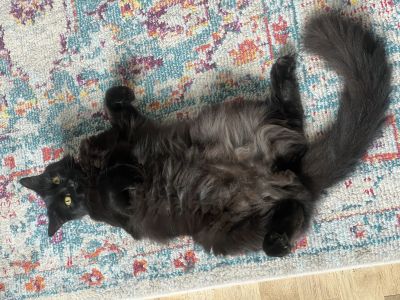
Posted By:
This weeks case was a real rarity and a first for any of us at the practice and involves the very handsome Albert.
He first came to see us in january as he had been a little lame on one of his hind legs. He first came to see us in january as he had been a little lame on one of his hind legs. Nothing specific was found when he was examined, but, knowing that young cats can get into all sorts of scrapes, he was prescribed some anti-inflammatories. I then saw him 3 weeks later, the anti-inflammatory medication hadnt really helped and at atimes he was carrying his leg rather than putting it down at all. By now, he was showing definite pain when his knee joint was manipulated, so we decided that he should be admitted for some x-rays.
While I was giving him a full examination, I did remark to his owner that he had a lot of deciduous (baby) teeth retainedin his mouth alongside his adult teeth. This is very unusual for a cat.
Albert was settled in the cattery and I handed him over to one of my collegaues for x-ray and filled him in with the details, as I was doing this, an unusual possibility came to mind - a condition called 'Knees and Teeth syndrome' (it does have a more scientific name as well).
The X-rays soon shows that Albert had a fracture right throughhis kneecap, confirming the diagnosis. This type of fracture is called 'pathological' as it isnt caused by trauma.
Knees and Teeth syndrome is being researched as we dont yet understand a great deal about it, probably because it is so uncommon. We think it may be at least partly hereditary and is seen in young cats. Its most usually the kneecap that fractures, although other bones can be affected as well. The kneecap is usually left to heal on its own, as there is a high risk of breakdown of a surgical repair. The retained baby teeth and any adult teeth which have not come through should be removed.
Because Albert had a very crowded little mouth with many teeth to be extracted, it was decided to refer him to a specialist dental team for a CT scan and treatment. After a long procedure, all the affected teeth with their fragile roots were sccessfully removed.
I saw him for a check up a few weeks after his extractions. His mouth had healed well and his owners noticed that he was eatinga lot more comfortably than before the procedure. He was also walking nomally as his kneecap fracture was healing. We'll always have to be aware of the possibility of further fractures, but for now, Albert is comfortable and living a perfectly happy life with hisloving family.
Whilst on my visits I have been having several discussions...
As our feline friends get older there are a few conditions...
Another winter discussion group season is now behind...
©2024 Shepton Veterinary Group Ltd., All rights reserved.
Privacy Policy • Terms & Conditions • Cookie Policy